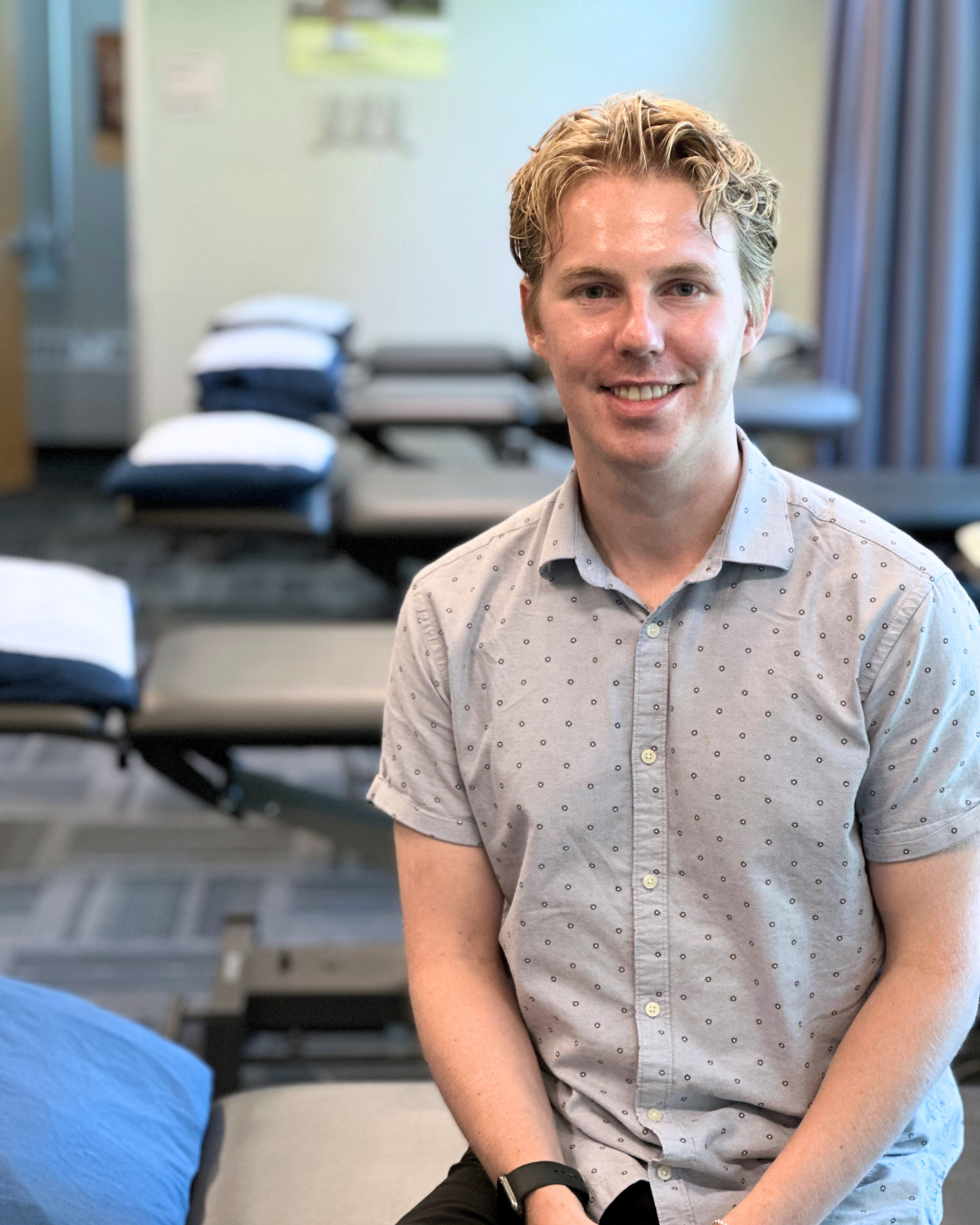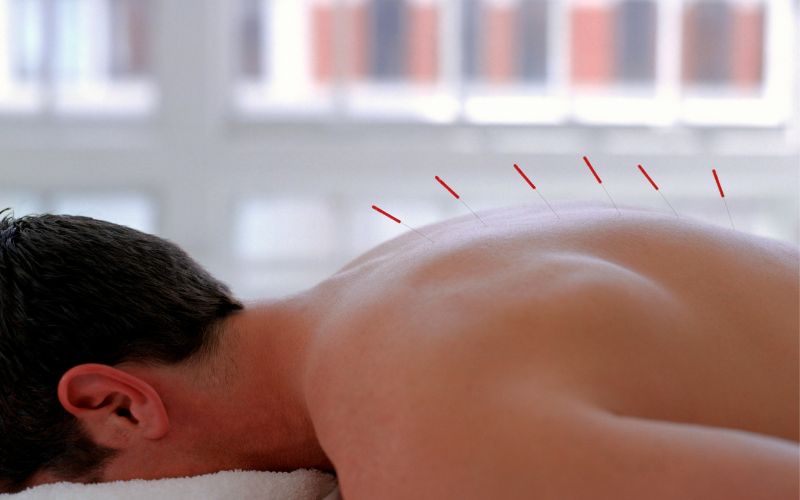When movement is medicine

By Keith Bradford
When chronic pain stops you in your tracks, getting moving again might just be the best medicine.
“A lot of people live with pain and think they have to give up doing the things they love,” says Greg Douglas, a physiotherapist at Mount Royal University’s Injury & Prevention Clinic.
“Pain has so many effects on our mood and our willingness to participate in daily activities and just enjoy life. A lot of times there are ways you can work around the pain, modify your activities, or build up to doing them.
“Research shows that when you get people doing things they enjoy, it can significantly help moderate the pain.”
Douglas understands how debilitating pain can be, having been diagnosed with Crohn’s disease in his youth. A few years later, when he was studying kinesiology at university, an opportunistic infection resulted in him being hospitalized for a week. He suddenly found himself unable to continue with an active lifestyle that involved swimming and playing hockey and lacrosse.
“I had to work with physios to get back walking and that’s when I decided to pursue physiotherapy as a career,” he says. “I’m super passionate about it. The biggest thing is the education behind it. We can do a lot of things hands-on, in terms of therapy, but a lot of the time people don’t understand what’s going on with their body and they’re not using it or moving it. If we can help them understand why it’s happening, it can make a big difference.”
Chronic pain — which is defined as pain that lasts more than three months despite medication or treatment — takes many forms. At the MRU Clinic, Douglas provides physiotherapy services to patients experiencing everything from lower back pain to sciatic nerve pain, neck pain and headaches.
“Not that physios are psychologists, but you have to look at the patient as a whole — not just the physical injury,” Douglas says, who works with patients with many different conditions but has a special interest in chronic pain. “What is going on with this person’s life and what makes them tick? How can we use that to help motivate them to participate in their rehab and get them back to daily life?
Douglas takes a whole-body, movement-focused approach to care. He combines physical therapy techniques with patient education and therapeutic exercise, helping people understand and improve how their bodies function.
“I’m more of a facilitator than a treater. When you get a cold and your body aches, you don’t want to do all the tasks of daily living, so imagine living with this back pain that gets progressively worse. You feel helpless and it affects your overall happiness.”
Douglas has seen firsthand how taking a holistic and educational approach to treating pain can have an enormous impact on both mental and physical health.
“I had a patient walk into the clinic who was dealing with chronic back pain,” Douglas says. “He loved golf, but it was so bad he couldn’t play anymore. He couldn’t walk more than a block and a half. He’d seen a doctor and thought he needed spinal fusion surgery. He said coming to physio was his last chance.
“It turned out that a lot of his back pain was from pressure on the nerves. He felt useless at work and had to take a break every five minutes. I started educating him on why it was happening and piecing it together.”
A week after his initial appointment the patient noticed a big improvement in his condition. A few months later, he wrapped up his treatment with one final visit to the clinic.
“He came in and told me he’d just played his first round of golf in more than 10 years. He said he was crying in the parking lot after the round,” Douglas says. “You just saw how grateful he was. You can’t fix many conditions in 30 minutes at the clinic, but over time you can have a big impact. It’s about giving patients the tools to get back to doing the things they love.”
Douglas, who also volunteers as a physio at the Mustard Seed, said the magic associated with movement isn’t restricted to high-performance sport.
“A lot of people think exercise is going to the gym or going for a run or going to play a sport,” he says. “Exercise can be things that you are doing at home. Vacuuming is not an easy thing to do, housework … just purposeful movement of the body.”
As one of several practitioners at the multidisciplinary clinic at MRU, Douglas enjoys being able to work alongside and collaborate with athletic therapists, acupuncturists, chiropractors, podiatrists, sports medicine doctors and family physicians.
“It’s super nice having the different practitioners here,” Douglas says, who has an undergraduate degree in human kinetics and a master’s in physiotherapy from the University of British Columbia. “When you’re dealing with pain there’s a lot of different ways to approach it. Everyone has a different process.”
In addition to helping others find a way to tackle chronic pain, Douglas has also found a way to manage his own pain journey. His flare-ups have subsided and he now enjoys playing tennis and hockey. He recently picked up running and completed a marathon.
“I’ve been lucky. I’m living a healthy lifestyle, staying active and monitoring my stress levels,” he says. “It was important for me to understand that I’m more than just the condition I’ve been diagnosed with. You need to try to find joy and do some of the things you want to do.”
Douglas recommends that patients suffering from chronic pain don’t wait too long before booking an appointment.
“We try to raise awareness about the importance of getting people to come in for pain sooner rather than later. The longer you have pain, the harder it is to get out of it,” he says.
“Doing things that are not going to hurt them will help patients increase how much they are moving and get back to doing activities. We might not always be able to fix your pain, but we are going to help guide you to a way that allows you to work on it.”
Read this next
Getting to the Point - The Benefits of Accupuncture
Acupuncture’s roots can be traced back more than 3,000 years, but its integration into mainstream Western medicine has been a more recent phenomenon. We sit down with Dr. Sarah Twelvetree to discus why acupuncture remains a mystery to so many.
READ STORYConnect with us
Address
4825 Mount Royal Gate SW
Calgary, AB T3E 6K6
U216, Wellness Services
Hours of operation
Monday - Friday: 8 a.m. - 8 p.m.
Saturday: Closed
Sunday: Closed
Subscribe to our newsletter



